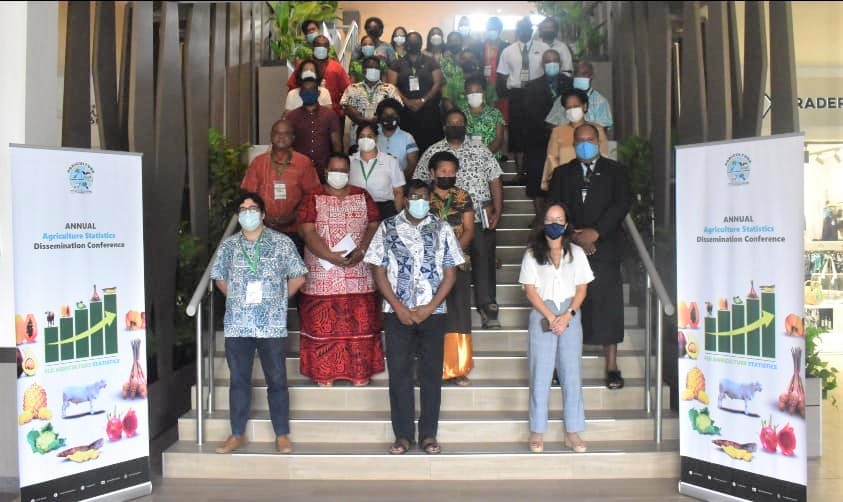RELEVANT DATA DISSEMINATION CRITICAL TO POLICY FRAMEWORK DEVELOPMENT - MINISTER REDDY
December 7, 2021

Picture: Minister for Agriculture Hon. Dr. Mahendra Reddy with the Ministry staff and stakeholders at the Sofitel Resort.
Maintaining the integrity of agricultural data collated over a certain period of time for the development or review of relevant policies is imperative for the development of the sector.
Additionally, utilizing acquired data for policy making to foster structural changes within the primary industries (agriculture, fisheries & forests) was critical as changes in these sectors were, especially in the agriculture sector, was not definitive or permanent and was always subject to change as it was determined by related time-sensitive data.
This was relayed by Minister for Agriculture, Waterways and Environment Hon. Dr. Mahendra Reddy when officiating at the 2021 Agricultural Statistics Dissemination Conference held at the Sofitel Resort, Denarau in Nadi yesterday.
He added that in order for these expected outcomes to be achieved, all the necessary steps leading up to the compilation of factual information and its subsequent results needed to be adhered to, like observing exact methodologies to lead data collection from targeted audiences.
“Now for any research, the most critical part is the methodology. The methodology includes the philosophical approach, the theoretical base and the approach to data collection and the analytical framework.
“So the methodology is the overarching framework where the researcher approaches the particular problem based on a philosophical foundation. Different researchers have different philosophical foundations, as some may be more qualitative, while others are quantitative. So it’s very important that you get the methodology right,” said Minister Reddy.
In the same vein, Minister
Reddy also praised the conduct of the 2020 Fiji Agriculture Census as it
encompassed a large sect of farming households, from agriculture, fisheries,
forests and sugar-based ventures, which was a truly comprehensive exercise.
“We have close to 80,000 agricultural households in Fiji and this is the first time ever that we’ve had comprehensive data on all agricultural households, including farmers.”
“I must say that the recent census was a masterpiece in terms of getting the required data to answer the questions that we all had in mind. It was so comprehensive that for the first time ever, we had detailed data by gender, by sector (fisheries & forestry sector included), now initially when I looked at it, for any researcher the accuracy of the data can be negatively correlated with the length of the questionnaire because it could compromise the quality of data you get,” he said.
“It is also important that we don’t jeopardize the quality of data collated, and I am pleased that the objectives of the Census were achieved in terms of the targeted demographics.”
Minister Reddy stressed to the participants of the conference that they all played a pivotal role in mapping out the future economic growth and trajectory of Fiji because as they were advisors to the decision-makers.
“Policy making cannot be made on past data, of course, you learn from past experience but you need to look at what is happening on the ground and advice on new policies because the policy making process is dynamic in nature and for the same issue, policies are made at different points in time because you need to make interventions, so the only way you can change an existing policy is if the new data tells you something else.
“Data providers and users should be able to understand and accurately interpret disseminated agriculture statistics, enhance their knowledge and understanding of its implication on economic growth and development, investment, productivity, societal change and at the same time, map the broader agriculture data needs of users/stakeholders for next 5 to 10 years,” said Hon. Reddy.
The following topics will be
discussed during the 2-day conference:
· The 2020 Fiji Agriculture
Census Data; for economic growth and development
· Agriculture Production data
for increased investment and better marketing linkage
· Agriculture Trade Data for
increase productivity
· Improving agricultural data
systems for better health and education
· Improving agricultural data systems for Socio-economic inclusion, poverty alleviation and gender equity;
This two [2] days conference also allows data producers to display and promote information that is readily available and can be accessed and used to influence policies, plans and decision making to ensure no one is left behind.
-Ends-
